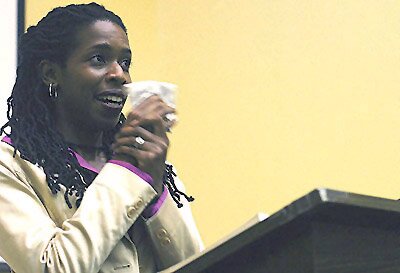"We Live in a Rape Culture"
On the evening of May 15, 1995, Lori Robinson, a writer for Emerge magazine in Washington, D.C., was coming home from her job when she was startled by two men at her door. She turned to her right to say hello and was greeted with the barrel of a gun at her temple. The men forced her into her house, blindfolded her, and, using tape, bound her hands and covered her mouth. Then she was raped. The experience changed her life. Lori Robinson is the author of �I Will Survive: The African-American Guide to Healing from Sexual Assault and Abuse.� Robinson spoke to a crowd of about 250 students and faculty at North Carolina Central University in September to raise rape awareness and teach young people how to deal with and prevent sexual assault. Robinson now travels the country promoting her book. Robinson stressed that rape victims focus on their medical and emotional health. She said victims should get checked out immediately after an assault. Her advice was to leave your appearance unaltered � don�t brush your hair or teeth, don�t shower and don�t change clothes. Sexual assault victims should not hide their experience and should seek counseling � even some �non-Western healing modalities,� she said. �We live in a rape culture,� Robinson said. �Rape is perpetuated through sexism and misogyny. The way we�re socialized around what sex is affects our ideas about what rape is.� Robinson stressed the need for re-education on ideas about sex, respecting boundaries, and consent. Robinson said she was �encouraged to see so many men in the audience,� because rape is not just a woman�s issue. According to Robinson, racism and the black experience in America affect the way sexual assault is perceived. Black men were lynched based on the myth that they were sexual predators. During the first two-thirds of the 1900s, she said, no white men were convicted of raping black women. �Black women were raped by their slave masters. They had no sexual autonomy or ownership over their bodies,� she said. Students responded favorably to Robinson�s presentation. �I don�t know where to start. I feel so privileged to have gotten the information,� said political science freshman Quandra Adams. �I admire her for being a young black female who has publicized her experience and was able to put it behind her.� Recreational administration junior Charles Bush provided a male perspective. �She brought up some good points: our history, the stigma put on black men as being sexual predators, talking about the healing process and what takes place.� Robinson said she wants students to remember that sexual assault is not the victim�s fault, that the crime is not just a woman�s issue and that everyone has the power to do something about it. And she stressed that men themselves must get involved in rape prevention. �Whenever one man rapes, other men are looked as a rapists,� she said. Posted Oct. 20, 2004 |
https://blackcollegewire.org/culture/041020_lori-robinson/
|
Home | News | Sports | Culture | Voices | Images | Projects | About Us Copyright © 2006 Black College Wire. Black College Wire is a project of the Black College Communication Association and has partnerships with The National Association of Black Journalists and the Robert C. Maynard Institute for Journalism Education. |
